Addison Herron-Wheeler is the editor-in-chief and co-owner of OUT FRONT Magazine (OFM), an LGBTQ magazine and daily online publication based in Denver. The magazine was one of the first of its kind in US history. Founded in 1976 by Phil Price, a University of Colorado Boulder student, OFM remains an important voice in the LGBTQ+ rights movement. As part of an ongoing effort to include and amplify diverse stories that reflect our state’s history, the Colorado Historic Newspapers Collection (CHNC) is excited to join forces with History Colorado to digitize a portion of the OFM archive, beginning with the first issue published on April 2, 1976, through to June of 1991, with the hopes of doing more in the near future.
On a snowy Denver morning at the cusp of the new year, Addison kindly agreed to sit down (via Zoom, of course) with Leigh Jeremias, Digital Collections Coordinator at CSL, and Mike Peever, Consultant Support Specialist at CSL, to reflect on the continuing legacy of this publication. Click here to check out OFM on CHNC!
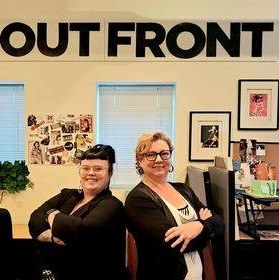
Mike: Thank you for being with us today – we’re really excited for this project and thankful we get the chance to talk to you about OUT FRONT! Let’s start with how you got involved with the magazine, if you don’t mind.
Addison: I’ve been with OUT FRONT for about five years now, at least as a freelancer. I saw the magazine around town, and I thought it was so cool. So, I reached out about writing. And then, when the editor left, I asked the person who was stepping up to become editor if the editing assistant/online editor position was available, and after bugging him for a while about that I got hired. Eventually, when he left, I became editor. Recently, Maggie Phillips and I became the co-owners of the magazine, so now I’m co-owner and editor-in-chief.
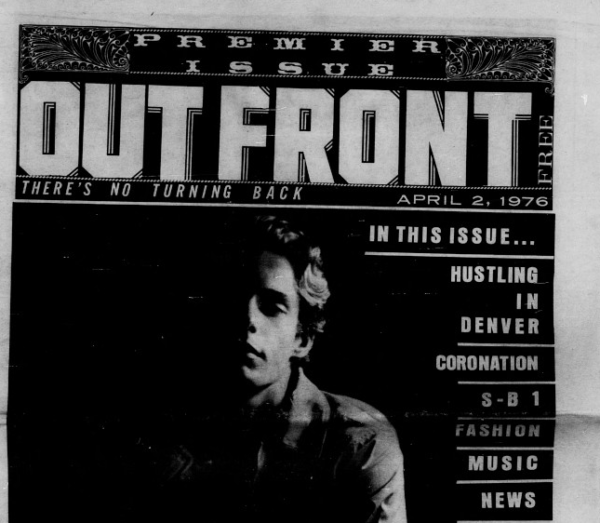
Leigh: Congratulations!
A: Thank you!
M: Congrats! Can we talk a little bit about our joint project? What does it mean to you that these issues will be saved for posterity and will be made freely available in CHNC?
A: I’m so excited about it. This is something I’ve wanted us to do for a really long time now. We have the books of our magazine, which is great, and we have some discs of early digital issues, but I think this is definitely the best way to absolutely ensure that everything that OUT FRONT has done can be preserved – literally forever.
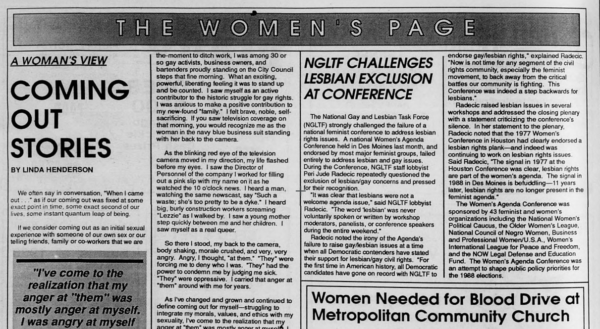
M: That’s what we do! So, to begin with we will be digitizing from 1976-91. How is that period significant to LGBTQ rights, and as a side question, was the publication always embracing of everyone under the LGBTQ+ umbrella, or was it primarily aimed at gay men, as so many periodicals of the time were?
A: One thing that stands out with us is that I’ve seen more inclusion in our pages than maybe in some other publications and media back in the seventies and eighties. There was definitely a heavier focus on gay men for a long time. In fact, I think Maggie and I are the first female owners of the magazine, and I believe we are one of just a few female-owned LGBTQ magazines in the country. The industry is still super male dominated, for sure. But, that whole period is super important to preserve because of the history of the AIDS crisis and civil rights for LGBTQ people. Before OUT FRONT was officially a magazine, it was an illegal zine because it was still actually illegal to give out information about LGBTQ issues because it was considered pornography and you could get arrested for having it on you. So, we started from being literally illegal and we’ve grown from there to where we are today. I also think that period is super significant because our first editor, Phil Price was a huge activist and someone who really took a stand in the beginning. OUT FRONT is the second oldest LGBTQ media in the country, second only to Philadelphia Gay News, which is a newspaper, so we are technically the first LGBTQ magazine in the country.
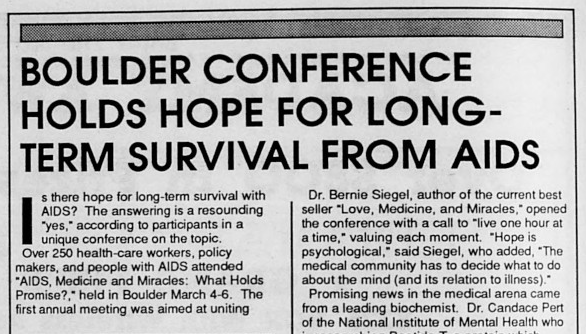
L: Would you have considered it a newspaper when it first started?
A: I guess you could call it a tabloid, because when it started and into the 2000s it looked more like Westword, where it had magazine qualities, but it was still on newspaper stock and ad heavy. Since then we have transitioned more into just being a magazine. And going into 2021, transitioning from twice a month to monthly, it’s going to be a heavier focus on being an arts and culture magazine; there’s news in it, but we are definitely not a newspaper or a tabloid.
M: Can I ask you about the current climate in the media and where OUT FRONT fits into that landscape currently?
A: I think that this is a super important time in media in so many ways. With everything that has happened in the last few years with Trump and the political and social unrest, I think it’s more important than ever for people to be able to either get their voices out there or know that this is a place where they can find news that will take queer issues into account without being super biased (unless it’s an opinion piece). Also, with the pandemic people are reading a lot more online stories, they are on social media a lot more, they are reading magazines again, maybe they didn’t for years. So, we’re a super important resource now both for culture and entertainment, but also for news. I know personally I had an awakening moment when Trump was elected and I really wanted to make sure that whatever I’m doing with my life as a job is something that really aligns with my morals. That’s why I pushed really hard to work at OUT FRONT, even though at first I was just a part time freelancer, then taking a major pay cut to be assistant editor and having to get a second job because the job was part time, but I really stuck with it. Especially starting in that role in 2016, it was so powerful to see not only all of the upsetting things that have happened and all of the stories that have needed to be told, but also all of the uplifting things that have happened despite everything else and all of the cool information we’ve been able to share in that timeframe.
M: It seems like people realize now more than ever how important their engagement is, which brings me to the resurgence of the social justice movement with Black Lives Matter. Are LGBTQ rights sometimes sidelined against what is perceived as the more pressing issue of racism?
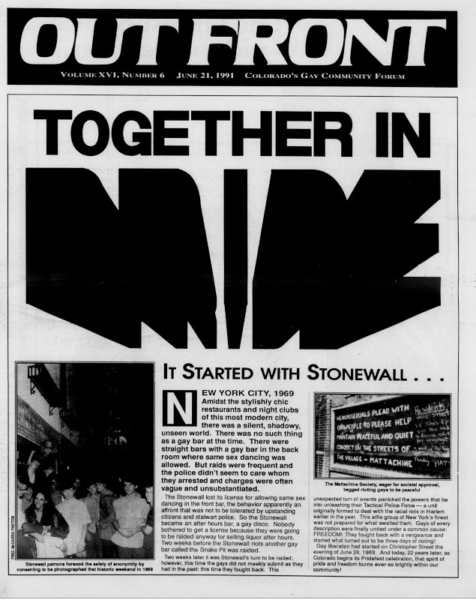
A: This past summer was really interesting to me because we went into the summer going, “Oh my gosh, this is going to be awful.” We always do Pride and not only is it a huge emotional and social event for everyone, it’s a big money booster for OUT FRONT, because people love to advertise in the issue we give out at Pride. And it was a big wake up call that Pride has become this money maker, and we’ve maybe gotten a little bit away from the message of Pride which is all about social justice. So, I more see it as the issues are intrinsically linked and intersectional, and you can’t have a movement for black rights without speaking for the queer people in those communities, and you can’t talk about queer equality without talking about Marsha P. Johnson and the Stonewall uprising and the fact that black trans women fought so hard for LGBTQ rights. So I kind of saw the summer as a really awesome reawakening of, okay, let’s combine these issues, let’s have events, and we’ll really protest this summer, but let’s have protests where we stand up for LGBTQ issues and for Black Lives Matter, because both things are under attack. And I don’t know if you all saw, but The Center who puts on Pride decided to move Pride Fest so that it’s not at the same time as Juneteenth, in order to not overshadow that or compete with that and have a more intersectional presence at both events: a bigger queer presence at Juneteenth and a bigger black presence at Pride. I think the key is for all of these issues to come together and fight side by side instead of calling out who is more marginalized. It’s more important to work together.
M: Intersectionality is the crucial word, isn’t it? I read recently just how high violence against black trans women is as compared to other groups.
A: Absolutely. I think often in the LGBTQ rights movement in general, from what I’ve seen since working here, it can still favor traditionally attractive cis white gay men and most other people in the queer community still don’t have their voices heard. That’s what I’m taking really seriously as a female-owned LGBTQ magazine, by really pushing for black voices, people of color, women, and trans people to be heard, not just cis white men.
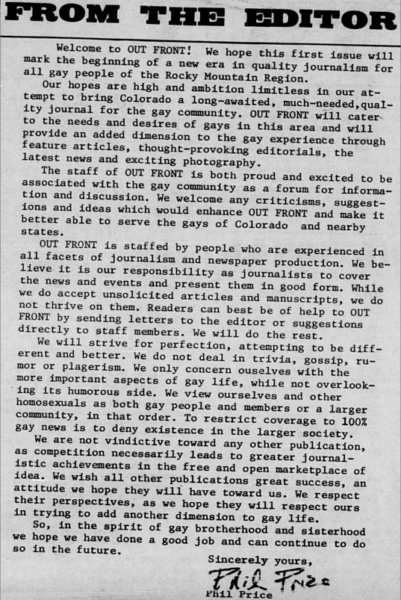
M: In many communities across the US, it is taboo to even discuss these issues, never mind question them, so what would you say to people who are perhaps feeling that conflict, especially over the past six months or so as there has been this huge interest in social justice – how do you ensure that you are speaking across those boundaries?
A: I think that’s one thing that OUT FRONT, at least since I’ve been here, has really struggled with. The message that we’re trying to send is that we really do want to be inclusive of everyone. One of our mottos is “Where you belong” and we really want to make sure that we make everyone feel like they belong in the queer community, no matter how they identify. I think that the way we’re trying to do that is being intentional about what our content is, really trying to make sure we have a lot of black, people of color and trans people represented on our cover. Not only has OUT FRONT not done that before, but queer media and in general has been more cis and white. And making sure that our content reflects women’s rights, black rights, trans rights, indegenous rights, all of the things that are important to us, not just going to the bars and having a great time with your friends. There has been an intentional shift away from bar advertisements and talking about bars. We are now partnered with Envision:You, an LGBTQ mental health nonprofit. This has really called to light an issue in the queer community, which is heavy reliance on substance abuse and bar culture. At the magazine we have embraced sobriety culture and why it’s so important to make a space for everyone, and not everyone feels included in bars.
M: What do you say to people who don’t necessarily identify as LGBTQ, and think perhaps there is nothing of interest for them in the publication?
A: We’re an LGBTQ magazine, we’re a queer magazine, so we’re for all genders and all orientations and even allies as long as you’re supportive of our cause and want to know about the issues and help us – we’re for everyone. I would say, there’s still a lot in our pages for you, and it can definitely be a great learning experience to learn about other people in the community, and just how many different stories there are to tell in the community.
M: What are some of the challenges facing the Colorado LGBTQ+ community currently? Any successes you’d like to mention?
A: I would say there are so many struggles, and successes. Speaking broadly, dealing with COVID, being out of jobs. I know I was a little disparaging of bars a second ago, but it’s how a lot of people make their living, for example drag performers performing for tips who are now trying to do it online. Or just queer people who lost their jobs like everyone else has. Not to mention everything going on with Trump and the bigotry coming to light. Those are the biggest challenges. Some things have been really heartening. We started a group called The OUTsiders, a resources group for the community where you can post job opportunities, body positive workout routines, cat pictures, whatever – seeing that community has been really great. OUT FRONT also faced a lot of challenges: we lost advertisers, we didn’t have Pride or other events, we lost a lot. We had to rely on the PPP and some of the assistance programs to stay afloat, but I feel like not only have we survived, we have exciting new ownership, a new office, and a new direction. We’ve managed to gain new advertisers, we haven’t had to let anyone go, and we’ve still managed to break the news. We didn’t miss a single print date, or a single day of posting, so I’m really proud of all we have been able to accomplish in light of all that’s happened over the past year.
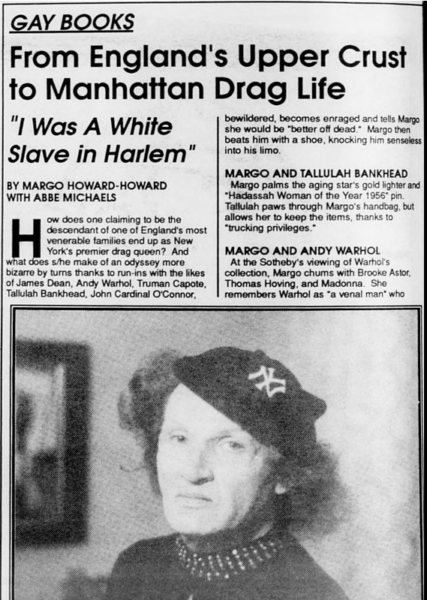
M: That’s a huge achievement! Thank you for speaking so articulately about all of these subjects. One last question for you: what is beautiful about your work?
A: I think the most beautiful thing about our work is just being able to share stories. So often people tell me they never thought they would share their coming out story, or their sobriety story, or their first date story. Or they never thought anyone would cover their work as a drag performer, but we did. All these people who are so happy to have found something they can relate to in our pages, or to read something about themselves that they never thought would get any publicity. Yvie Oddly, who won Rupaul’s Drag Race, was saying it had been her dream to be in OUT FRONT despite being such a huge celebrity and in much bigger magazines. It’s so awesome to me that people find that much inspiration in what we do, that’s the most beautiful thing.
- The Secret Lives of Book Club Sets - June 12, 2025
- Book Clubs Can Be Prideful - June 5, 2025
- Fast Facts – Kits and Book Club Sets - May 7, 2025